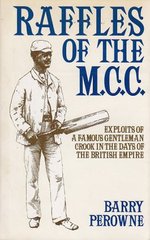Raffles of The M.C.C.
Archie Mac |Published: 1979
Pages: 250
Author: Perowne, Barry
Publisher: St Martins Press
Rating: 3.5 stars

Raffles, the gentleman thief first appeared in book form in 1899. The author, E.W. Hornung, was the brother-in-law of Arthur Conan-Doyle, and just as that author’s character, Sherlock Holmes, had Watson to marvel at his powers of deduction; Raffles had ‘Bunny’ Manders to be stupefied by his audacity and brazen crimes.
Hornung, again taking a leaf from his brother-in-law, killed off his legendary character, with Raffles dying a heroes death in the Boer war. The last Raffles story by Hornung appeared in 1909.
In the 1930s, Barry Perowne, with permission from the Hornung estate, brought back Raffles. He stopped writing about him in the 1950s before again writing two books featuring Raffles in the 1970s, before Perowne’s death in 1985.
Raffles of The M.C.C. is perhaps more moralistic than Hornung’s original creation, with Raffles and Bunny rarely keeping the proceeds of crime. Instead they often use their ill-gotten gains to assist those less fortunate than themselves and in whose lives they become involved.
The book features 11 short stories and although they all mention cricket, it’s disappointing that mentions are all we are provided with. We glean that Ruffles is a slow bowling all-rounder and in one story we are told he is captain of England. Despite the lack of cricket we still meet a number of contemporaries from the Victorian era in which the stories are set. C.B. Fry and Ranji earn mentions, although Perowne is at his best and seemingly most knowledgeable when he writes about literary greats.
The authors own style is classical, with a heavy emphasis on correct grammar and a seemingly in-exhaustive vocabulary. Although unlike other writers he does not throw in $3 words to impress in a sesquipedalian manner but uses the correct word whenever required.
Raffles of The M.C.C. despite the lack of cricket is an entertaining read about the most glamorous period of sartorially English life, when the only thing better than being an English gentleman was to be an English gentleman who was also a member of the M.C.C.






Leave a comment